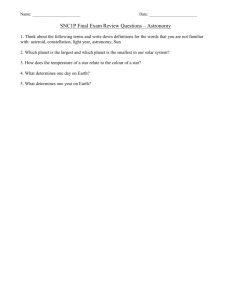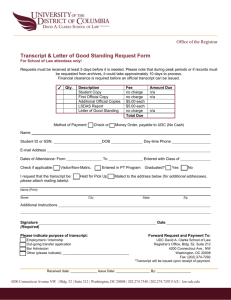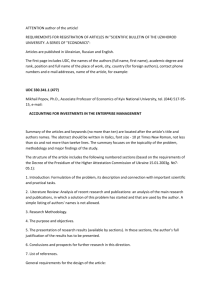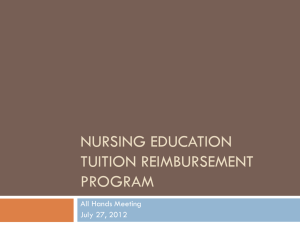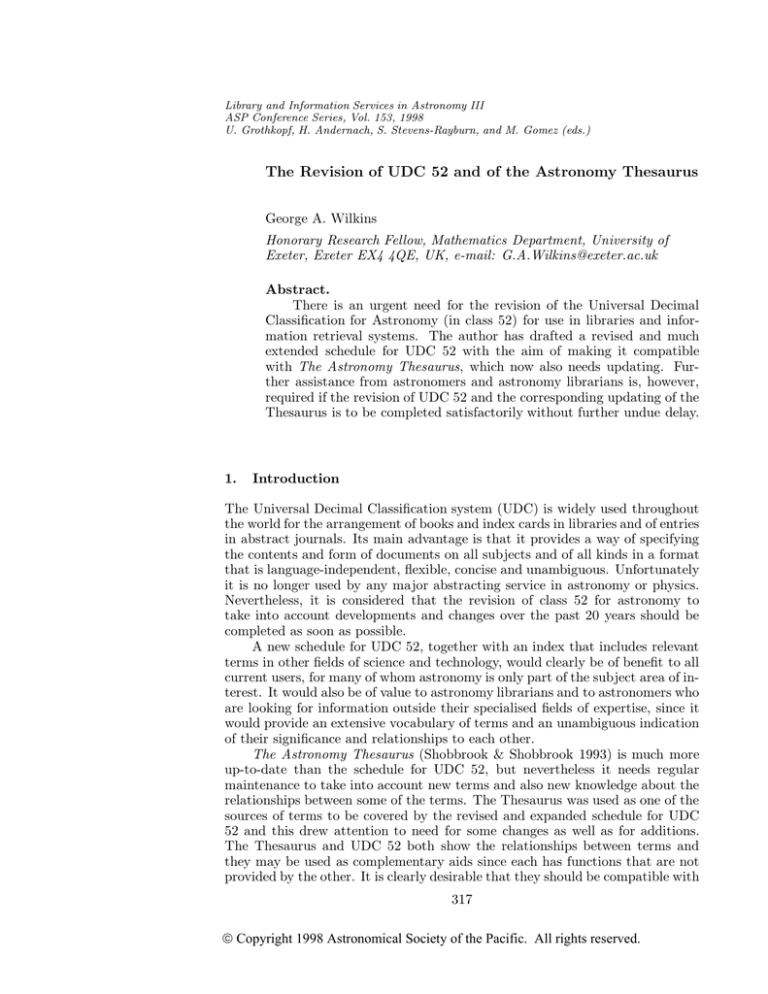
Library and Information Services in Astronomy III
ASP Conference Series, Vol. 153, 1998
U. Grothkopf, H. Andernach, S. Stevens-Rayburn, and M. Gomez (eds.)
The Revision of UDC 52 and of the Astronomy Thesaurus
George A. Wilkins
Honorary Research Fellow, Mathematics Department, University of
Exeter, Exeter EX4 4QE, UK, e-mail: G.A.Wilkins@exeter.ac.uk
Abstract.
There is an urgent need for the revision of the Universal Decimal
Classification for Astronomy (in class 52) for use in libraries and information retrieval systems. The author has drafted a revised and much
extended schedule for UDC 52 with the aim of making it compatible
with The Astronomy Thesaurus, which now also needs updating. Further assistance from astronomers and astronomy librarians is, however,
required if the revision of UDC 52 and the corresponding updating of the
Thesaurus is to be completed satisfactorily without further undue delay.
1.
Introduction
The Universal Decimal Classification system (UDC) is widely used throughout
the world for the arrangement of books and index cards in libraries and of entries
in abstract journals. Its main advantage is that it provides a way of specifying
the contents and form of documents on all subjects and of all kinds in a format
that is language-independent, flexible, concise and unambiguous. Unfortunately
it is no longer used by any major abstracting service in astronomy or physics.
Nevertheless, it is considered that the revision of class 52 for astronomy to
take into account developments and changes over the past 20 years should be
completed as soon as possible.
A new schedule for UDC 52, together with an index that includes relevant
terms in other fields of science and technology, would clearly be of benefit to all
current users, for many of whom astronomy is only part of the subject area of interest. It would also be of value to astronomy librarians and to astronomers who
are looking for information outside their specialised fields of expertise, since it
would provide an extensive vocabulary of terms and an unambiguous indication
of their significance and relationships to each other.
The Astronomy Thesaurus (Shobbrook & Shobbrook 1993) is much more
up-to-date than the schedule for UDC 52, but nevertheless it needs regular
maintenance to take into account new terms and also new knowledge about the
relationships between some of the terms. The Thesaurus was used as one of the
sources of terms to be covered by the revised and expanded schedule for UDC
52 and this drew attention to need for some changes as well as for additions.
The Thesaurus and UDC 52 both show the relationships between terms and
they may be used as complementary aids since each has functions that are not
provided by the other. It is clearly desirable that they should be compatible with
317
Copyright 1998 Astronomical Society of the Pacific. All rights reserved.
318
G. Wilkins
each other in their overlap and so it would be appropriate for their maintenance
to be carried cooperatively.
2.
Review of the revision of UDC 52
I first used the Universal Decimal Classification system in 1949 when I was a
research student at Imperial College, London. At that time UDC was used in
the Science Museum Library (which also served as the College library) and in
Physics Abstracts. I later found that it was used in the library of the Royal
Greenwich Observatory (RGO) at Herstmonceux Castle and in the Russianlanguage abstract journal produced by VINITI, and I came to appreciate the
value of its language-independent codes.
In the early 1970s I was asked to represent the RGO on a working group for
the revision of the schedule for astronomy in 521–525. This group, which met for
a few days in London, included D. A. Kemp, the librarian of the Royal Observatory at Edindurgh (ROE), who is best known for his Bibliographical Guide to
Astronomy and Astrophysics (Kemp 1970), and representatives of VINITI and
the British Standards Institution (BSI), which publishes the English-language
editions of UDC. Kemp was the prime mover in the development of a completely
revised schedule, which made extensive use of hyphen auxiliaries to identify, for
example, the properties and features of astronomical bodies. These auxiliaries
also allowed the cancellation of 525 for star catalogues etc. The class 522 for
practical astronomy was so out-of-date that it was replaced by a new subdivision
of 520.
The new schedule for class 52 was published by BSI in 1977; it included a
new schedule for geodesy in 528, instead of 526, but it left nautical astronomy
in 527 and chronology in 529 largely unchanged. An alphabetical index of terms
was included with the schedule. Kemp also drafted a guide to the use of UDC
for astronomy, and I started to edit it for publication, but the project was
abandoned when Kemp left ROE and I was given more administrative duties.
My attempts to initiate another revision ten years later failed and so after
my retirement from the RGO in 1989 it was agreed by the UDC Consortium
that VINITI should take responsibilty for the revision. Unfortunately, it appears
that, as a result of the political changes in Russia, VINITI no longer publishes
its abstract journal and no work has been done on the revision. I made enquiries
about the status of the revision in about 1994 and I was encouraged to try again.
I obtained the formal support of IAU Commission 5 for the task, but I could
not find anyone who was prepared to take an active part in the revision. Robyn
Shobbrook, who was herself still working on the Thesaurus, organised a meeting
about UDC 52 at LISA II at Garching and this led to the formation of the e-mail
group known as the ‘Friends of UDC 52’.
Since 1994 I have endeavoured to draft a revised schedule and index that
would cover explicitly all the terms that are likely to be used in the cataloguing
of astronomical books and papers and in the retrieval of information by the use
of subject indexes or by the use of computers to search abstracts and text. This
has taken much more time than I had expected, but as I am retired I have been
able to treat this as an intellectual challenge and I have not had to account for
my time to any employer or funding agency!
The Revision of UDC 52 and of the Astronomy Thesaurus
319
About a year ago, I reached the point where I realized that I could not
usefully go any further until I had had criticisms and contributions from both
astronomers and librarians and until I had received confirmation that my draft
was broadly acceptable to the Editor of UDC and to the UDC project manager in
BSI. Some changes will be required since, for example, it is UDC policy to make
use of common auxiliaries wherever possible, whereas I have tended to introduce
special auxiliaries that better match the particular usages in astronomy. There
is, however, no point in my attempting to make such changes until I am assured
that several other persons are willing to participate in the tasks that I have
outlined in following notes on the status of the revision.
3.
Status of the revision of UDC 52
The following work has been completed:
1. A comprehensive list of terms of relevance to astronomy has been formed
from a variety of sources, including The Astronomy Thesaurus, astronomical dictionaries and the titles of current papers and books.
2. The schedules for classes 520 (Observational astronomy), 521 (Theoretical
and positional astronomy), 523 (The Solar System) and 524 (Stars and
stellar systems. The Universe) has been revised and expanded to cover
the listed terms in so far as my knowledge has allowed. The use of 522 for
Theoretical Astrophysics has been proposed, but only an outline expansion
has been drafted. The schedule of hyphen auxiliaries, which allow the
identification of many different aspects of the contents and nature of a
document, has been greatly expanded.
3. UDC numbers have been assigned to the terms in the list wherever possible;
numbers outside 52 have been given where appropriate.
4. The draft schedule and index has been made available on the Internet by
‘anonymous ftp’ to the ‘Friends of UDC 52’, who have previously expressed
an interest in the project.
The following tasks remain to be done:
5. The draft expansion of some subjects is to be completed by astronomers
who have expert knowledge in the fields concerned, such as variable stars.
6. The draft schedule is to be reviewed by astronomers to verify that it is
scientifically satisfactory, by librarians to verify that it will be suitable for
the purposes of arrangement and retrieval, and by UDC experts to verify
that it is consistent with the general guidelines for the revision of UDC.
7. The index is to be checked against the final draft of the schedule for 52
and against the current schedules for non-astronomical terms.
8. Explanatory notes and auxilary information for publication with the schedule and index are to be compiled, reviewed and checked. The draft (1974)
of a Guide to the use of UDC in astronomy is available, but it needs to be
reviewed and updated.
320
G. Wilkins
9. The computer files for the schedule, index and notes are to be converted
to an appropriate format for typesetting for publication by BSI, on behalf
of the UDC Consortium, in a special-subject volume. I would like to see
this material made available more quickly on the World Wide Web, as is
The Astronomy Thesaurus and its translations into other languages.
4.
Conclusion
As I am now approaching ‘three-score and ten’ and have other projects that
I would like to complete while I am still fit and active, I would be delighted
if someone else would take over from me the responsibility for organising the
completion of the revision. I realize, however, that this is a service job that will
not be of immediate and obvious benefit to any particular organisation; rather
the benefits will be spread widely, but thinly. Consequently, I am prepared to
try to see the project through to completion, but only if enough other members
of the astronomical community are willing to participate.
Any person who would like to assist in any part of these tasks, or who
knows of anyone who would be prepared to help, is invited to contact me and
become a ‘Friend of UDC 52’. It is open to persons who play an active role in
the revision to become members of the IAU Commission 5 Task Group on the
Revision of UDC 52. My e-mail address is g.a.wilkins@exeter.ac.uk.
References
Kemp, D. A. 1970, Astronomy and astrophysics; a bibliographical guide, London: Macdonald Technical & Scientific
Shobbrook, R. M. & Shobbrook, R. R. 1993, The Astronomy Thesaurus, Epping,
Australia: Anglo-Australian Observatory


